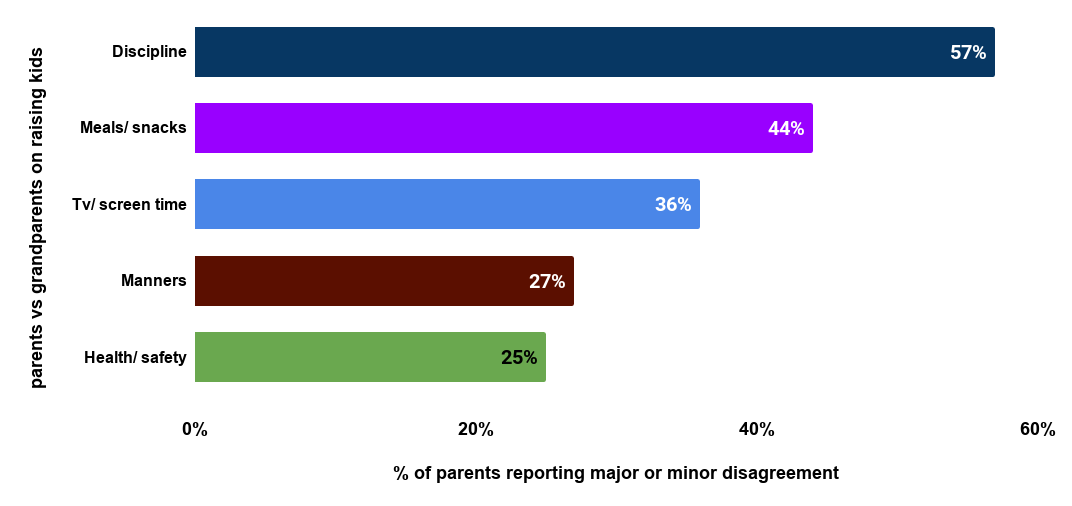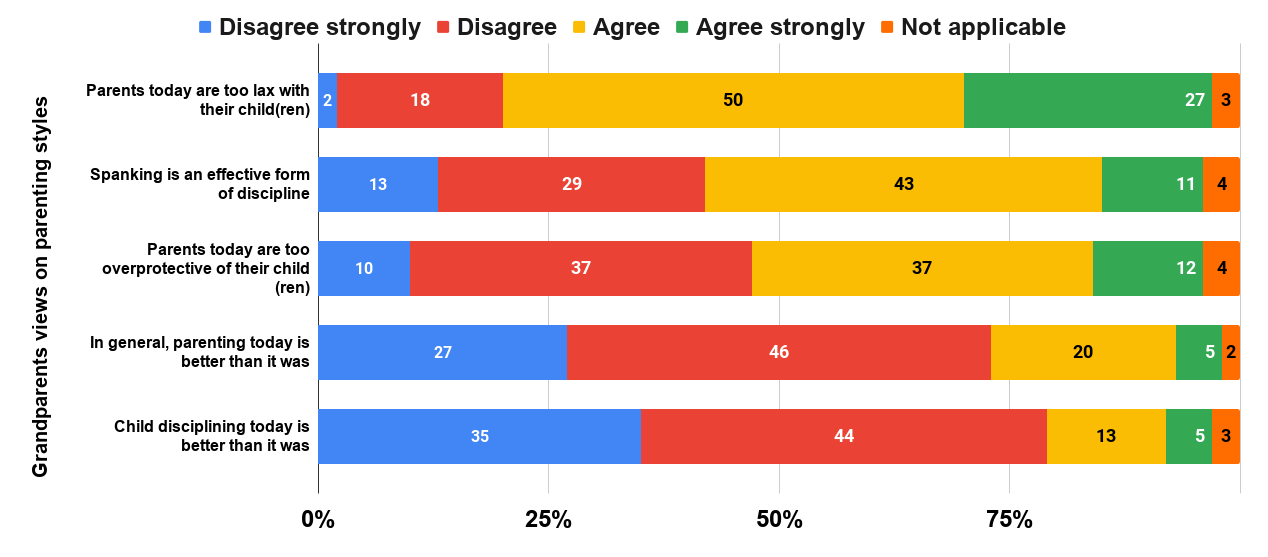Important Signs That Your Daughter-in-law Doesn’t Like You
WhatToGetMy Instructional Article
How your daughter-in-law feels about you can affect the quality of the relationship you share with your son and grandchildren. Worse still, it can tear an entire family apart and this is worrisome. In this article, we’ve identified signs that tell you if your daughter-in-law dislikes you. Secondly, we’ve provided reasons why mother-in-law’s and daughter in-law’s don’t get along, and lastly, we proffered ideas on how to deal with a daughter-in-law that doesn’t like you. This article has been divided into three main sub-headings which are;
- Why do daughter-in-laws dislike their mother-in-laws?
- How to tell if your daughter in law doesn’t like you
- How to deal with a daughter in law that doesn’t like you
“The most heated and persistent problems arise between two women – the wife and the husband’s mother. While 15 percent of mother-in-law/son-in-law relationships have some tension, 60 percent of mother-in-law/daughter-in-law relationships are described by some strong negative terms such as, “strained”, “uncomfortable”, “infuriating”, “depressing”, “draining”, “simply awful”. Terri Apter, terriapter.com
Watch the video version of this article:
WHY DO DAUGHTER IN-LAWS DISLIKE THEIR MOTHER IN-LAWS?
In this section, we’ve identified three main reasons why a daughter-in-law would dislike their mother-in-law and they are;
- Her preconceived ideas about mother-in-laws which are then confirmed or denied by observing the character and personality of her mother-in-law.
- How a daughter-in-law view the involvement of her mother-in-law in her parenting style to be and,
- The type of expectations a daughter-in-law perceives her mother-in-law has towards her and how she runs her home.
These points have been explained in depth in the 3 bullet points below.
1. Mother-in-laws have been vilified to the extent that they stir the feeling of fear, anxiety, and distrust in many women before they become daughter-in-laws. There are numerous memes, jokes, news reports, and threads on social media platforms about mother-in-laws that put them in a negative light. Mother-in-laws are associated with being problematic, controlling, unreasonable, hostile, difficult, manipulative, and many more negative terms. With various shared experiences about mother-in-laws out in the open, people will respond differently to this information.
As a mother-in-law, you need to first understand that your daughter-in-law might already have some level of skepticism about mother-in-laws, and therefore you are not relating with her on a clean slate. Her views about you might be tainted to an extent even if your son speaks positively about you. It is how you act towards her that will either confirm or deny her fears. Your first impression counts and indeed many other impressions. She will be watching your interactions with people without you knowing and she will be paying attention to the comments you make about other people. If she dislikes you, it’s probably because of the way she perceives you to be. She might be struggling to trust you.
2. Most disagreement parents and grandparents have is centered on parenting styles. In a survey report by mottpoll.org, out of 89% of parents that reported that their child saw at least one grandparents often or occasionally, 6% reported that they had a major disagreement with one or more grandparent about their parenting choices while 37% reported that they had a minor disagreement with one or more grandparent about their parenting choices. It is important to note that parents care about how other people perceive their parenting skills. In a study by pew research, 72% of parents that participated in the study wanted their parents to have a positive appraisal of their parenting skills. Sadly, this might not happen, and here is why;
In a study conducted by aarp.org, grandparents viewed their parenting style as more superior to today’s parenting style. They felt that the current parenting style was too overprotective of children and too lenient. These different parenting ideologies between parents and grandparents might result in the following outcomes;
- Grandparents’ over-involvement in the parenting of their grandchildren which becomes offensive to daughter-in-law.
- Grandparents under-involvement in parenting styles as a result of parents’ reprimand. Sometimes when parents ask grandparents to limit their intrusion into their parenting style, grandparents might take offense and begin to care less for their grandchildren as a way to spite parents. This can be considered offensive to the daughter-in-law. She might even begin to see the mother-in-law as a manipulative person. If your daughter-in-law dislikes you, it might be based on your involvement in her parenting style.
Parents vs grandparents on raising children, source mottpoll.org

Grandparents view their parenting style as superior to today’s parents, source: aarp.org, page 15. The number of grandparents that participated in the study (n=2654).

3. Another source of conflict for daughter-in-laws and mother-in-laws is their perception of gender roles. Studies describe this type of conflict as intergenerational conflict. A daughter-in-law and her mother-in-law might have differing views on the responsibilities of a good wife, mom, and woman. This will be evident in how they handle the affairs of their homes. Their differing ideologies might result in both women judging each other based on various unrealistic standards. According to Terri Apter in her book titled What do you want from me?: learning to get along with in-laws “Mother-in-law/daughter-in-law conflict often emerges from expectations that each is criticizing and undermining the other”. The author further explains that mother-in-law’s routine standards might make her daughter-in-law believe that she expects her to follow her standards. At the same time, daughter-in-law preferred routines might make mother-in-law feel like she is being undermined. If your daughter-in-law dislikes you, it could be because she feels that you have unrealistic expectations of her and that you might be too critical of her.
A survey report on What daughter-in-law finds most hurtful about mother-in-law, source: fatherly.com

HOW TO TELL IF YOUR DAUGHTER IN LAW DOESN’T LIKE YOU
Have you noticed anything about your daughter-in-law that left you worried or uncertain about her true feelings towards you? Did she act in ways that you found provocative or alienating? Did she respond in an unkind manner that you found rude and unnecessary? If yes, you might be right that you are one of your daughter-in-law’s least favorite people in the family. If your daughter-in-law does not like you, she might display her dislike in the following ways;
1. She hardly picks your calls or responds to your messages; she rarely calls you or sends messages.
If you call your daughter-in-law and she rarely picks her call, be wary. You might ask “what if she is busy?” This is a legitimate question. So here are a few extra questions to ask yourself.
- Does she return your missed calls as soon as she can?
- When she returns your call, how does she sound? Is she always overly excited? Does she rush to end the call all the time? Does she sound bored or disturbed by your calls all the time?
- Does she take the initiative to call you on her own just to converse with you? Even if it is occasionally?
- Does she prefer to pass on a message to you through your son, grandchildren, or any third party instead of speaking to you directly?
- Does she respond to your messages as soon as she can or does she ignore them?
If your daughter-in-law rarely returns your calls, it is not a good sign. If she returns your calls and she sounds overly excited every time, it could mean that she is trying to put on a polite front. If she is always brief with her response to end the call, she probably doesn’t want to be having a conversation with you. If she rarely takes the initiative to call you without you calling first or her returning your missed call, it is not a good sign. Even if you do not have a phone, a daughter-in-law that cares about you and likes you will still try to reach out to you even if it is occasionally. If she prefers to communicate to you through her husband, your grandchildren, or a third party, it is not a good sign either. If your responses to most or all these questions are negative, don’t ignore your hunches yet.
2. She would always find excuses not to be there
If your daughter-in-law does not like you, she will always look for ways to avoid you. You can hardly ever convince her to attend a meeting or event you will be attending. It doesn’t matter if you informed her about it well in advance, she will not compromise her time to be with you. If she shows up for family events, it would be because your son convinced her to do so or she is doing it out of respect for the rest of your family.
3. She rarely visits or calls you when you are going through a rough time
The people that should understand your situation and that of the family are members of the family. If as a member of your family, your daughter-in-law rarely cares about what you and the family is going through – whether it is loss, sickness, or conflict – she doesn’t like you at all. She might call once, but that is it. She will do it to fulfill all righteousness. It could also be that they just have a conscience. If your daughter-in-law wants little to do with you and the family, she doesn’t like you.
4. She avoids you at family events or meetings and wants nothing to do with your family
If she doesn’t like you, she will try as much as possible to maintain a healthy distance away from you. You will hardly see her in the same space as you. If she does, she will either be awfully quiet or make conversations with the next person. If you try to converse with her, she will most likely act ignorant of the topic just to avoid having a lengthy conversation with you.
5. Most things you do will irritate her and she will always second guess you
If she always has something negative to say about you and what you do, if she always doubts how genuine your actions are regardless of how good they are, it means that she does not trust you and certainly does not like you. You will hardly get the benefit of the doubt. Things she may ordinarily overlook for other people, she will not overlook when you are involved.
6. She will try to limit her husband’s interaction with you
The one person that links both of you together is your son and so far he is a big part of your life, you will remain relevant in her family. The best way for her to avoid you is to limit his interaction with you. She will do this by either emotionally blackmailing him and trying to paint you bad. She may complain that he pays more attention to you than her and her children even if it is not true. She might convince him to limit how he financially supports you even if it’s not a burden to him or the family. If your son communicates with you weekly, she may try to limit that too. If you ever disagree with your son, she will encourage him to stay away from you. Every chance she gets to make him stay away from you completely, she will take it.
7. She will prefer her husband and kids to spend time with her own family than with you and your family
Her family will have more access to her home than you will have. She will ensure that her children are well acquainted with her side of the family than with her husband’s side of the family. Sadly, when it comes to issues like this, the men of the family try to limit their input for the sake of peace in their home.
8. She will be hostile to you
She will not want to be friends with you no matter how much you try. She will act like she doesn’t hear or see you sometimes. She will give you a forced smile and may use a lot of sarcasm when addressing you or speaking about you.
9. She will be unhappy when your grandchildren warm up to you
When your daughter-in-law dislikes you, she will use as many avenues as she can find to hurt you including tampering with the relationship you want or have with your grandchildren. She would either limit their visits or your visit. In situations where your grandchildren still see you as a cool grandma, she might try to distort their view of you by antagonizing you in front of them. She might also take away gifts you get for them and give your grandchildren awful explanations about why they should not have such gifts.
10. She won’t want help from you.
Even if you are capable of helping her out, she will prefer another person over you. If she gets persuaded to accept your help, she will reluctantly do so and give a forced appreciation or none at all.
If your daughter-in-law has acted in the above ways, perhaps it’s time that both of you work on your relationship. Perhaps you’ve tried before and it didn’t work, and you feel like it’s a hopeless cause. We sincerely wish that both of you do not give up on each other. We’ve provided tips on how to handle issues with your daughter-in-law.
HOW TO DEAL WITH A DAUGHTER IN LAW THAT DOESN’T LIKE YOU
Considering how important a mother-in-law and daughter-in-law relationship is to the entire family, both women should be on good terms with each other. Here are a few helpful tips for mothers-in-law.
1. Call your daughter-in-law and son and speak to them.
It is not enough to assume or accept that your daughter-in-law does not like you; it is important to try and iron out grievances. It is other people that bear the burden of a conflict between mothers-in-law and daughter-in-law. It is not fair that members of the family have to be forced to side with you or her. It is equally painful when people have to act neutral or passive when there is a conflict between the two women they love. Ironing out grievances is a good start. It provides both parties the opportunity to speak up about what is hurting them in the relationship. She might not want to speak to you alone and it is equally not advisable in some cases to speak to her alone. Ask for a meeting with her and your son. Involve your husband if need be.
2. Try to respect her boundaries and get her to respect yours.
A lot of conflicts that ensue between mother-in-laws and daughter-in-laws boils down to either woman overstepping their boundaries. Every healthy relationship has boundaries that should be respected by all parties involved. Learn her boundary and respect them. Show her your boundaries that should be respected. If she says that you should try and call before coming over, it should be respected. Respect her parenting style/choices. In your house, your rules should be respected, in her home, her rules and that of her husband should be respected.
3. Reassure her of her place in the family. Be warm and welcoming.
In this day and age, a lot of people rely on social media for information. unfortunately, a lot of content on social media portrays mother-in-laws are vile creatures; more capable of doing wrong than good. The possibility that your daughter-in-law might have read or heard a lot of awful things about mother-in-laws are high, therefore try not to make issues worse than they are. Be friendly and welcoming. She is the woman your son is spending the rest of his life with, the mother of your grandchildren (if she has children). Do not make it hard for her in the family, neither hard for her to be free around you.
4. Develop a good negotiating skill
Most grievances can be solved objectively as opposed to emotionally. Manipulation from either party does more harm than good. Since both of you share someone in common (her husband/your son), you will have to find a common ground with her. Make her understand how important your son and grandchildren are to you. Reassure her that you will not intrude in her family affairs but rather, you just want them to continue to be in your life, including her. Both of you can agree on when it is convenient for the grandchildren to visit and what rules should be respected by both parties. You and your daughter-in-law must be explicit with your demands.
5. Understand that there are differences in personality and upbringing
In as much as you would want your daughter-in-law to be a certain way, she is who she is. She could be an introvert or a quiet person and that is fine. Not everyone is good with making conversations (an example) and they should not be considered hostile when they don’t contribute much to a discussion. If she is a vegetarian and the rest of the family isn’t, it is still fine. It is her choice. So far she is accomodating of other people’s choices, it is only fair to accommodate hers. If there are character flaws that affect you, talk to her about it. For example, if she uses a lot of swear words when conversing and you do not like it, talk to her about it. Let her know that you do not appreciate her using swear words when conversing with you.
6. Learn to stay away from the equation
When you’ve tried all you can do to salvage the situations and things remain the same, learn to go with the flow. Do not impose yourself on her family. You would not like another person to do that in your family. You do not want to worsen the situation by complaining a lot. It puts you in a negative light. It will make you look overly demanding and unreasonable in another woman’s family. Do not cling to your son. He has a life and deserves to be happy. He will always be part of your life but it is unfair to expect him to be as present as he has been in the past when he was not yet married
7. Do not overly compromise
When it comes to compromise in the relationship, it should not always come from you. If it comes from you alone, you will get mentally and emotionally exhausted. More so, it will make you dislike her much and even put you in a position of being used by her and your son at will. You should not be remembered only when a babysitter is needed. If there are times that babysitting is not convenient, let her know. Talk to her and your son. You should not always feel like you are walking on eggshells around her. Know what you want for yourself and be firm about it. Do not forget to be considerate in your demands.
FREQUENTLY ASKED QUESTIONS
1. Why does my daughter-in-law disrespect me?
Disrespect occurs when there are no clear boundaries in a relationship, secondly, when someone has refused to respect boundaries. If both of you have clear boundaries that you both understand and she disrespects yours, she should be made aware of her offense. If after you’ve told her about it and she still continues with the behavior, disassociate from her as much as you can. If your daughter-in-law continues to disrespect you in your home, you can ask her and your son to leave your house until things improve. Respect her boundaries too.
2. What do I do when my daughter-in-law lacks trust in me?
Usually, when people don’t trust us, it is because of the experiences they have with us. Perhaps she knows certain things about you that make her not trust you. For example, if she feels like you gossip about other people a lot, she might find it hard to confide in you about certain things in her life or her family. If she finds you to be too lenient or too harsh with her children, she might find it hard to leave them with you for a long time. Try to identify areas where she lacks trust with you and try to act better.
CONCLUSION
There are two responsibilities most daughter-in-laws and mother-in-law share in common in a family; wife, and mom. The expectation is that since they share these roles, they would be more tolerant of each other. Sadly, it is not the case. Studies show that mother in-laws and daughter in-laws have more conflict than mother-in-laws and son-in-law. Studies also show that most conflicts stem from conflict of interest. Daughter in-laws are often in conflict with their mother in-laws about parenting styles and gender roles. We’ve identified 10 signs that tell you whether your daughter-in-law dislikes you or not. We’ve also proffered 7 ways to handle your daughter-in-law. We hope that this article helps you address any issues you might be having with your daughter-in-law.
01 HOUR 33 MINUTES
ESTIMATED TIME DESIGNING AND UPLOADING THIS ARTICLE
16 HOURS 53 MINUTES
ESTIMATED TIME RESEARCHING AND WRITING THIS ARTICLE
You Might Also Like

17 Signs of a Simple Minded Person
17 Signs of a Simple Minded Person WhatToGetMy Instructional Article Simple minded people are generally frowned upon by society for their apparent lack of intelligence and cavalier attitude towards life. These same people, however, seem to be able to navigate life pretty well and generally


